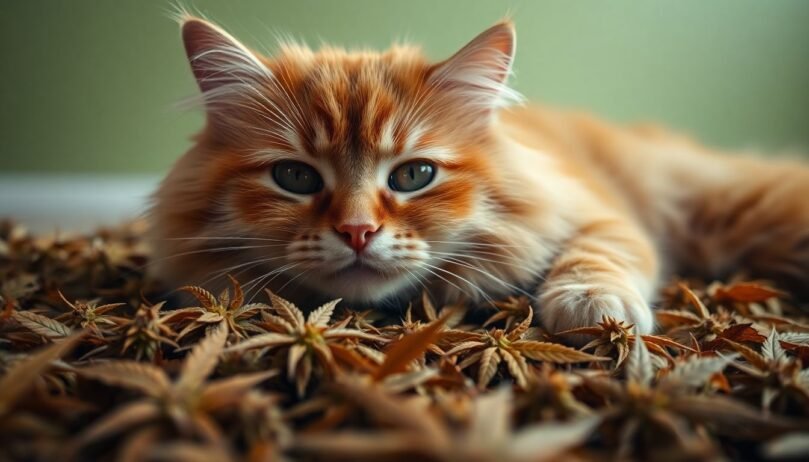Cats and Weed: Marijuana Toxicity in Cats
- 8 March 2025
- BuyAPet Editorial Team
- All Cats, Cat Health
Cats and Weed: Marijuana Toxicity in Cats
Ever had that moment of panic where you wonder, “Is cannabis safe for my cat?” With the rise of legalized marijuana, accidental exposure in cats is becoming a growing concern. This guide explains the risks, symptoms, and how to protect your furry friend.
What is Marijuana Toxicity in Cats?
Marijuana toxicity happens when a cat reacts negatively to cannabis. Unlike humans, cats cannot process THC—the psychoactive compound in marijuana—safely. Even a tiny amount can overwhelm their system and cause severe symptoms.
How THC Affects Cats
THC interacts with a cat’s endocannabinoid system, which influences mood, coordination, and pain response. Because cats are far more sensitive to THC, a dose that’s harmless to humans can be dangerous or even life-threatening for them.
Forms of Marijuana and Potency
- Dried flower: Lower concentration of THC compared to other forms.
- Edibles: Highly concentrated and appealing to cats due to added flavours like chocolate or butter.
- Concentrates/oils: Extremely potent, even a tiny lick can be toxic.
Important: Edibles pose a double risk — THC toxicity and poisoning from ingredients like chocolate or xylitol.
Recognizing the Symptoms of Marijuana Poisoning
Quick recognition of symptoms can make a life-saving difference. Watch for these warning signs:
Common Symptoms
- Loss of balance or wobbly walking (ataxia)
- Dilated pupils
- Excessive sleepiness or lethargy
- Vomiting
- Loss of bladder control
- Unusual changes in heart rate
Severe Symptoms – Emergency Care Needed
- Seizures or tremors
- Coma or unresponsiveness
- Difficulty breathing
If you see these symptoms, seek veterinary care immediately.
How Cats Are Exposed to Marijuana
Cats can encounter cannabis in several ways, often by accident:
- Ingesting edibles: Brownies, cookies, or gummies left within reach are tempting to cats.
- Secondhand smoke: Inhaling marijuana smoke can irritate lungs and cause toxicity.
- Chewing on plants or dried flower: Curious cats may nibble on cannabis plants or stored buds.
Diagnosis and Treatment
How Vets Diagnose THC Toxicity
Your vet will review your cat’s history and symptoms, possibly run lab tests, and rule out other conditions. If marijuana exposure is confirmed, treatment will begin immediately.
Treatment & Supportive Care
- Inducing vomiting if ingestion was recent.
- Administering activated charcoal to absorb toxins.
- IV fluids to prevent dehydration and support organ function.
- Hospitalisation for monitoring in severe cases.
Be honest with your vet about the substance involved. This helps them treat your cat effectively and safely.
Prevention Tips
Safe Storage
Keep cannabis products in sealed, locked containers and store them high out of reach. Don’t leave edibles or flower on counters or tables.
Responsible Use
- Avoid smoking marijuana in the same room as your cat.
- Ensure good airflow if smoking occurs elsewhere in the home.
- Keep cannabis plants behind closed doors or use deterrents.
Educate Visitors
Make guests aware that you have a cat and ask them to keep their cannabis products secure. This simple step can prevent accidents.
Conclusion
Marijuana toxicity in cats is serious and can be life-threatening. Awareness and prevention are your best defences. If you suspect your cat has been exposed, seek veterinary care immediately.
Responsible storage and use of cannabis protect both your cat’s health and your peace of mind.
